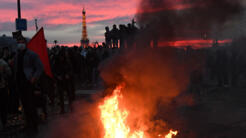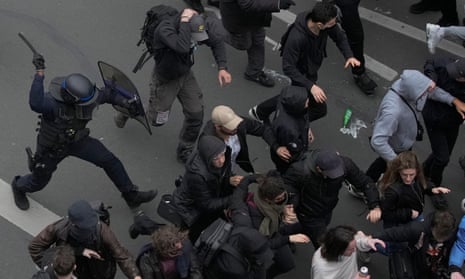Europe's leading human rights watchdog has accused the French police of using “excessive force” during protests against a fiercely contested pension law.
Dunja Mijatovic, the Council of Europe's human rights commissioner, said those wishing to gather peacefully had a right to be protected from “police brutality” and attacks by protesters against officers did not justify a heavy-handed response.
She called on France to respect the right to protest, describing the situation as “worrying”.
The warning comes as tensions in France continue to rise, with more demonstrations expected over the weekend and a national day of action planned by unions next Tuesday. The continued unrest, heightened after the government pushed through the controversial law without a vote, prompted the postponement of King Charles’s planned three-day state visit to France on Sunday.
“Violent incidents have occurred, some of which have targeted the forces of law and order. But sporadic acts of violence by some demonstrators or other reprehensible acts committed by others during a protest cannot justify excessive use of force by agents of the state,” Mijatovic said in a statement on Friday.
“Nor are such acts sufficient to deprive peaceful demonstrators of their enjoyment of the right to freedom of assembly. It is up to the authorities to allow the actual exercise of these freedoms by protecting peaceful demonstrators and journalists covering these protests against police brutality and against violent individuals acting within or on the sidelines of marches.
“While a state may be authorised to use force in order, inter alia, to restore order, such use should be a last resort and in strict compliance with the conditions of necessity and proportionality. The primary obligation of every Council of Europe member state is to protect the people under its jurisdiction and their human rights.”
The police have been accused of making arbitrary arrests and using unnecessary force when dealing with protesters angry at Emmanuel Macron’s pension law, which raises the retirement age from 62 to 64. Demonstrations across the country have been mostly peaceful, but have degenerated into clashes between small groups of protesters and police and the destruction of public and private buildings and property.
Hundreds of people have been arrested and detained. The majority have been subsequently released without charges.
“The release of many people without charges calls into question the necessity and proportionality of the measures taken against them,” Mijatovic added. “Violence, wherever it comes from, can never be used as a means to resolve a social and or political crisis. The violence must stop. This is a necessary condition for the effective exercise of the freedoms of expression and assembly, as well as for trust between the population and the police.”
Le Monde reported that in one audio recording it had obtained and authenticated, a number of police officers could be heard threatening youngsters arrested during a pension protest last Monday. “I can tell you, we have broken elbows and faces,” one officer reportedly said.
Reporters Without Borders said police had assaulted several “clearly identifiable” journalists during the recent demonstrations.
On Thursday, 1.1 million people according to official figures, 3.5 million according to unions, took to the streets across France for a ninth day of protests policed by about 12,000 law and order officers.
The previous day, Macron, whose centrist government narrowly survived a vote of no confidence on Monday, inflamed the public mood during a television interview in which he said the law would go ahead. The bill is currently being examined by the Constitutional Council; if approved it is expected to come into effect in September.
Afterwards, unions, opposition leaders and critics accused the president of “arrogance and contempt” and vowed to continue the strikes and protests.
On Friday, the interior minister, Gérald Darmanin, announced 11 investigations had been opened into alleged incidents of police violence during the pension protests.






